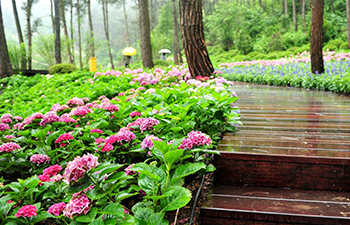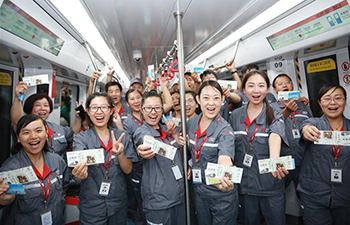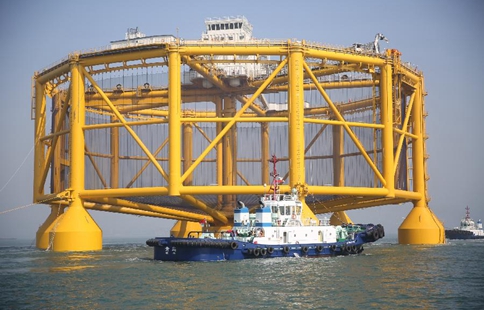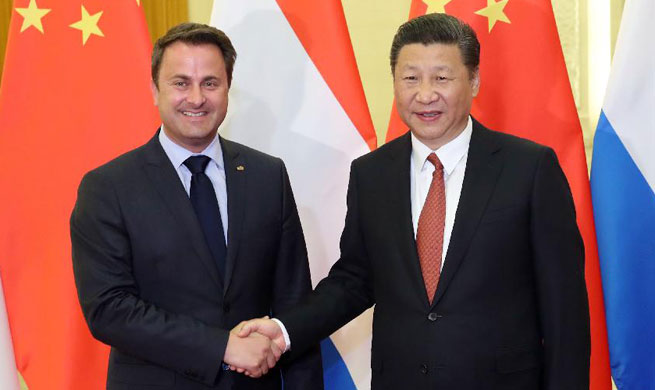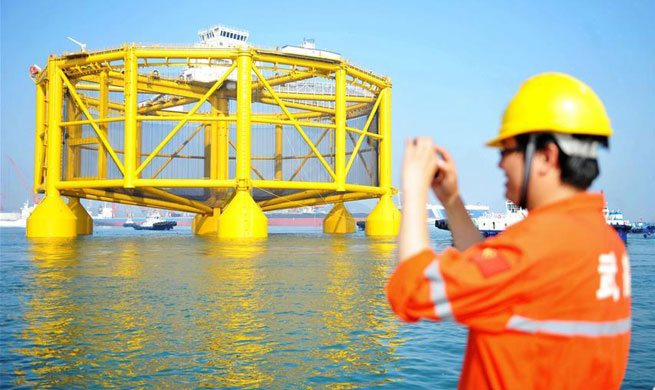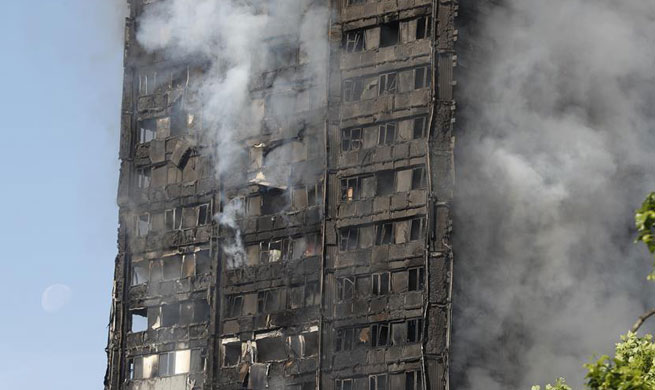TOKYO, June 14 (Xinhua) -- Former Japanese defense minister continued to question Prime Minister Shinzo Abe's approach to changing the postwar constitution, saying on Wednesday his ruling Liberal Democratic Party (LDP) needs to better clarify the situation regarding the nation's Self-Defense Forces (SDF).
Speaking at a press conference at the Foreign Correspondents' Club of Japan in Tokyo, Shigeru Ishiba said simply adding the existence of the SDF in the constitution would not lead to its legitimacy as a "military".
"It's not just enough to write down the existence of the SDF in the constitution," said the veteran LDP lawmaker, who is widely regarded as Abe's biggest potential rival for the LDP's leadership.
He was referring to Abe's proposal to keep the current paragraphs of the war-renouncing Article 9 in the constitution, but adding a specific reference to the SDF so that their existence, expanded roles and geographical scope can no longer be deemed unconstitutional.
Article 9 of Japan's pacifist Constitution currently states that "the Japanese people forever renounce war as a sovereign right of the nation and the threat or use of force as means of settling international disputes." It goes on to state that... "land, sea, and air forces, as well as other war potential, will never be maintained. The right of belligerency of the state will not be recognized."
To date since it being sanctioned at the end of Word War II, the pacifist charter has been interpreted by the government as not prohibiting Japan from maintaining forces of a strictly defensive nature. But further interpretations during Abe's tenure have led to new, controversial security legislation which allows for an expanded operational scope of the SDF.
Ishiba contends however that merely appending a paragraph that recognizes the existence of the SDF does not clarify its status constitutionally and as such the same inherent contradictions to Japan maintaining a military would remain.
"So currently we are saying the Air Self-Defense Force with 200 F-15 fighter jets is not an air force, the Ground Self-Defense Force with the most advanced tanks is not an army and the Maritime Self-Defense Force with six Aegis ships is not a navy. It is natural to see a question emerge -- then what is the SDF?" Ishiba quizzed Wednesday.
He went on to say that any discussions in the revision of Article 9 should involve communicating to the public clearly and coherently whether the SDF should be designated a bone fide military or not.
Ishiba also said that other pertinent issues need more clarification, such as the level to which Japan is allowed to defend itself and clarifying unequivocally the exact details of Japan's exclusively defense-oriented policy.
Ishiba described these vital discussions and debate as a "mission" for the ruling LDP to overcome the current confusions, inconsistencies and ambiguity surrounding the SDF and a possible revision to the constitution.
The LDP heavyweight further said that on the one hand every country has the right to defend its sovereignty, on the other, for Japan specifically, possessing military forces has been unpopular internationally and particularly among the Japanese people, as notions of Japan's military are quick to be associated with the nation's past militarism and wartime aggression.
Ishiba also said that Abe highlighting the year 2020 as the timeframe for the revision to come into force, to coincide with the Olympics and Paralympic Games to be hosted in Tokyo, was "illogical."
He is adamant that far more effort is needed to deliberate with other parties on the issue and attempt to reach a broad consensus one way or the other, and, as has not been the case with other forced legislation recently, feels the general public need to be better informed and included in the dialogue.
Japan's main opposition Democratic Party has, for its part, described Abe's push to amend the constitution as being "a serious infringement on the legislative process."
Following Abe making a televised address announcing his intention to amend the pacifist clause of the nation's charter to legitimize the SDF's existence by 2020, the Democratic Party has claimed Abe has, in fact, intervened in the parliamentary process.
At the first lower house commission on constitutional issues that was convened, the Democratic Party insisted Abe retract his proposal with Masaharu Nakagawa, a lower house member, remarking that, "It is the Diet that has the right to initiate a constitutional revision. Prime Minister Abe's remarks have therefore been a serious infringement on the legislative process."
Abe's proposal has been met with staunch opposition from both ruling and opposition camps who believe the only way to proceed with the constitutional amendment of such a thorny issue is through careful parliamentary discussion and debate, not the "steamrolling" tactics Abe is known for.
Pro-amendment factions within the ruling Liberal Democratic Party and its Komeito ally, as well as in the opposition bloc, share a broad consensus that even though the ruling camp has the two-thirds majority necessary in both houses of parliament to bring about a national referendum on the issue, gaining the basic understanding of all parties is an essential first step for the motion to proceed.
Along with Democratic Party members, Japanese Communist Party member Seiken Akamine blasted Abe's remarks as being an "undue intervention into issues that should be handled by the Diet," adding that any change to the war-renouncing article in the constitution would change the charter's pacifist nature entirely.




